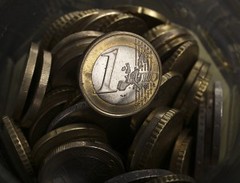
PREV ARTICLE
NEXT ARTICLE
FULL ISSUE
PREV FULL ISSUE
The Euro Coin Size Switcheroo
A blog item I came across this week describes a change to the size of Euro coins. Were any of our readers aware of this?
-Editor
Thinking it what be a simple job they copy-and-pasted the original sizes set out back in 1998. Unfortunately, however, those dimensions were never really used by euro zone minters. If you measure a one euro coin for example, it is likely to by 2.33 mm rather than the 2.125 mm that was originally stipulated, while a 2 euro coin will be 2.2 mm rather than 1.95 mm. The ECB therefore ruled that to avoid confusion and all the hassle involved in replacing every ticket machine in the euro zone, the best approach would be to change to numbers on the legal document. Seems a sensible move, the only question I guess is do bigger coins carry a greater inflation threat?
To read the complete article, see:
ECB currency intervention of a different kind
(blogs.reuters.com/macroscope/2011/05/17/ The Numismatic Bibliomania Society is a non-profit organization promoting numismatic literature. See our web site at coinbooks.org. To submit items for publication in The E-Sylum, write to the Editor at this address: whomren@gmail.com To subscribe go to: https://my.binhost.com/lists/listinfo/esylum All Rights Reserved. NBS Home Page Contact the NBS webmaster 
|
